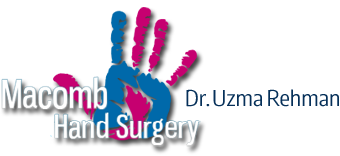Unexplained Finger Swelling Could be Achenbach Syndrome
Paroxysmal finger hematoma (PFH), also known as Achenbach syndrome, is a rare condition that causes sudden and painful swelling of the fingers. It is believed to be caused by the rupture of small blood vessels in the fingers, which leads to bleeding and swelling.
In this article, top Detroit area hand doctor Dr. Uzma Rehman discusses who is most likely to get Achenbach syndrome, what causes it, how it is diagnosed, and the various treatment options available.
Who Gets Achenbach Syndrome (PFH)
Achenbach syndrome (PFH) is most commonly seen in women, particularly those over the age of 50. It is also more common in people with a history of Raynaud’s phenomenon, a condition that causes the fingers and toes to become cold, numb, and painful in response to cold temperatures or stress. Additionally, PFH has been reported in people with lupus, scleroderma, and other autoimmune diseases.
Causes of Achenbach Syndrome (PFH)
The exact cause of Achenbach syndrome (PFH) is not known, but it is believed to be related to the rupture of small blood vessels in the fingers. This may be triggered by cold temperatures, trauma, or stress. It is also believed that PFH may be related to the underlying autoimmune conditions that some people with PFH have.
Diagnosing Achenbach Syndrome (PFH)
Achenbach Syndrome (PFH) is diagnosed by an experienced hand doctor based on the symptoms reported by the patient and a physical examination of the fingers. The hand doctor may ask the patient about their medical history, including any history of autoimmune diseases or Raynaud’s phenomenon.
Top Detroit area hand doctor Dr. Uzma Rehman may also perform tests to rule out other conditions that may be causing the symptoms, such as a blood clot or infection – and/ imaging tests, such as an MRI or ultrasound, to visualize the blood vessels and rule out other conditions.
Treating Achenbach Syndrome (PFH)
If your fingers are swelling without an obvious explanation, you should see a hand doctor as soon as possible. While there is no cure for Achenbach Syndrome (PFH), there are several treatment options available to relieve the symptoms.
In mild cases of PFH, the hand doctor may recommend rest and immobilization of the affected fingers – which may involve wearing a splint or brace to prevent movement and reduce swelling.
Applying a cold compress to the affected fingers may help reduce swelling and relieve pain. This may involve using ice packs, cold packs, or a bag of frozen peas wrapped in a towel. (Note: Never apply ice directly to the skin!)
Non-steroidal anti-inflammatory drugs (NSAIDs) may be prescribed by your hand doctor to reduce inflammation and relieve pain. In more severe cases, pop Detroit area hand doctor Dr. Uzma Rehman may also prescribe corticosteroids to reduce swelling and inflammation.
In rare cases, surgery may be necessary to drain the hematoma and relieve the pressure on the affected fingers. This involves making a small incision in the finger and draining the accumulated blood.
Achenbach Syndrome (PFH)
There are several steps you can take to reduce your risk of developing Achenbach Syndrome (PFH). These include avoiding exposure to cold temperatures, especially if you have a history of Raynaud’s phenomenon. Also be sure to wear warm gloves or mittens when you are outdoors in cold weather.
Take breaks and stretching your fingers regularly if you perform repetitive motions with your hands at work or home. And seek treatment for underlying autoimmune conditions if you have them.
Top Detroit Area Hand Doctor | Achenbach Syndrome (PFH)
Achenbach Syndrome (PFH) is a rare condition that causes sudden and painful swelling of the fingers, most commonly seen in women over the age of 50, particularly those with a history of Raynaud’s phenomenon or autoimmune diseases.
If you live in the greater Detroit area, and you are experiencing painful or unexplained swelling in your fingers, schedule an appointment with top Detroit area hand doctor Dr. Uzma Rehman today. She can diagnose your condition and offer treatments that will relieve your pain and provide you with the best possible outcome.

